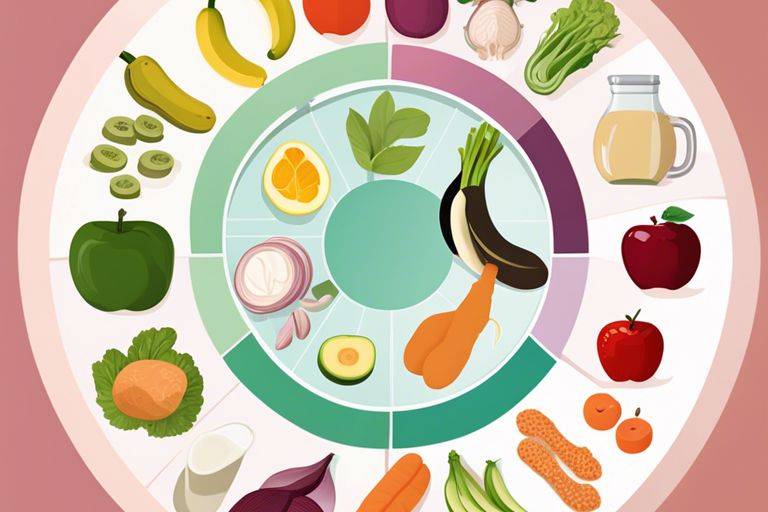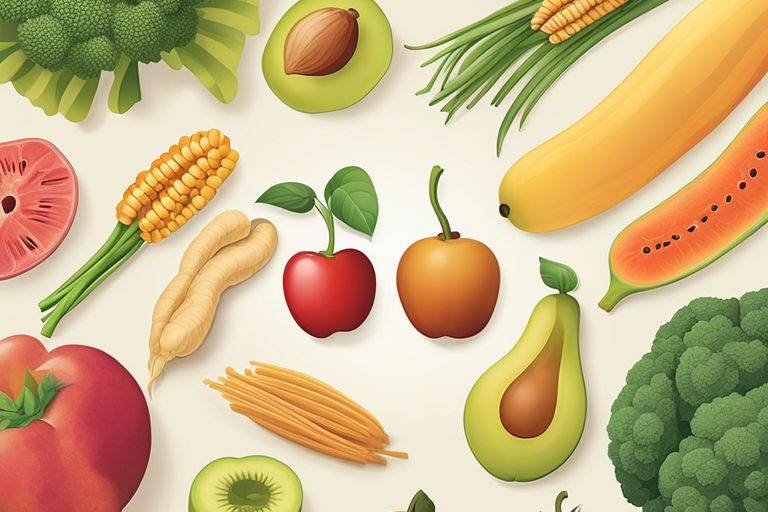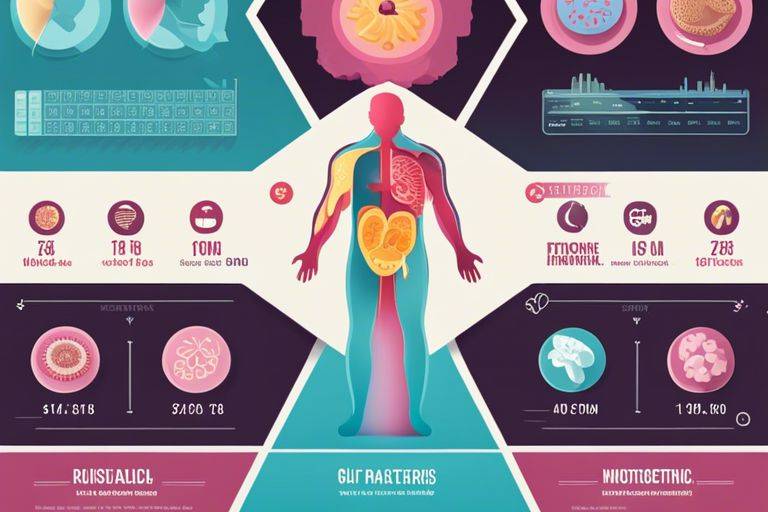Overwhelmed by gut health advice? Don’t worry – I’ve got you covered with a list of 12 crucial foods that can work wonders for your digestive system. Aiming to heal your gut and improve overall well-being? Stock up on probiotic-rich foods like yogurt and kimchi along with fiber-packed fruits and vegetables like apples and broccoli. Whether you’re dealing with bloating, indigestion, or simply want to boost your gut health, these foods are your secret weapons for a happy belly.

Key Takeaways:
- Probiotic-rich foods like yogurt, kefir, and kimchi can help improve gut health by promoting the growth of good bacteria.
- High-fiber foods such as whole grains, fruits, and vegetables can aid digestion and support a healthy gut microbiome.
- Fermented foods like sauerkraut, miso, and kombucha introduce beneficial bacteria to the gut, improving overall digestion.
- Bone broth contains collagen and amino acids that can help repair the gut lining and reduce inflammation.
- Ginger and turmeric have anti-inflammatory properties and can help soothe the digestive system.
- Coconut oil contains medium-chain triglycerides that support gut health by reducing inflammation and improving nutrient absorption.
- Apple cider vinegar can help balance stomach acid levels and improve digestion when consumed in moderation.
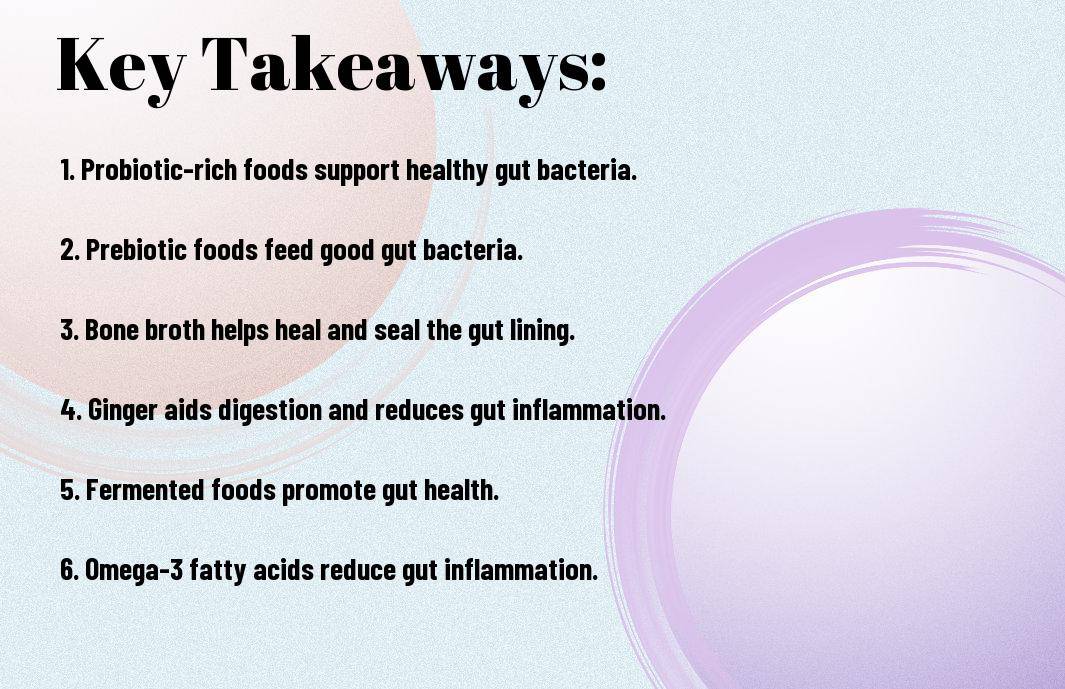
The Importance of Gut Health
Before I look into the 12 foods that can heal your gut, let’s understand the significance of gut health. According to Best Foods to Eat for Gut Health, a healthy gut is necessary for overall well-being. It plays a crucial role in digestion, nutrient absorption, and even supporting the immune system.
The Gut-Brain Connection
One of the fascinating aspects of gut health is its connection to the brain. Research has shown that the gut and the brain communicate through the gut-brain axis, impacting mood, cognition, and overall mental health. Nurturing your gut with the right foods can support a healthy gut-brain connection.
Symptoms of an Unhealthy Gut
On the flip side, an unhealthy gut can manifest in various ways, such as bloating, gas, constipation, and even skin issues. It can also lead to fatigue, unexplained weight changes, and food intolerances. If you experience these symptoms frequently, your gut health may be compromised.
Connection: It’s crucial to pay attention to these signs as they could indicate a deeper issue with your gut health. Ignoring these symptoms can lead to more severe conditions down the line. By addressing gut health proactively, you can prevent these issues and promote overall wellness.
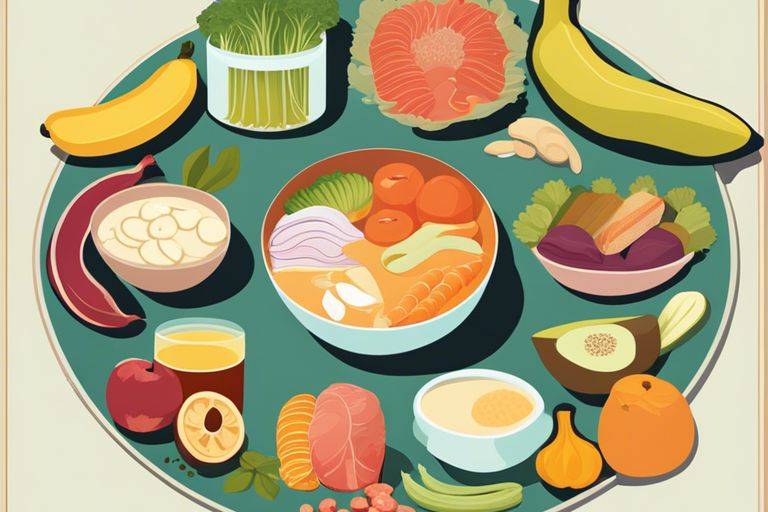
The Power of Food in Gut Healing
You are what you eat, especially when it comes to gut health. The food you consume plays a significant role in not only maintaining a healthy gut but also in healing it. By incorporating certain foods into your diet, you can promote the growth of beneficial bacteria in your gut and improve your overall digestive health.
Prebiotics and Probiotics
To kickstart your gut healing journey, incorporate prebiotics and probiotics into your diet. Prebiotics are non-digestible fibers that serve as food for the beneficial bacteria in your gut. They can be found in foods like garlic, onions, bananas, and oats. On the other hand, probiotics are live beneficial bacteria that can be found in fermented foods like yogurt, kefir, and kimchi, helping to restore the balance of your gut microbiome.
Fermented Foods
Probiotics play a critical role in maintaining gut health, and one of the best sources of probiotics is fermented foods. Fermented foods like sauerkraut, kombucha, and miso are rich in beneficial bacteria that can help improve digestion, boost immunity, and reduce inflammation in the gut. Including a variety of fermented foods in your diet can have a positive impact on your overall gut health.
Understanding the power of food in gut healing is important for anyone looking to improve their digestive health. By incorporating prebiotics, probiotics, and fermented foods into your diet, you can support the growth of beneficial bacteria in your gut, improve digestion, and promote overall well-being. Making conscious choices about what you eat can have a profound impact on your gut health and quality of life.
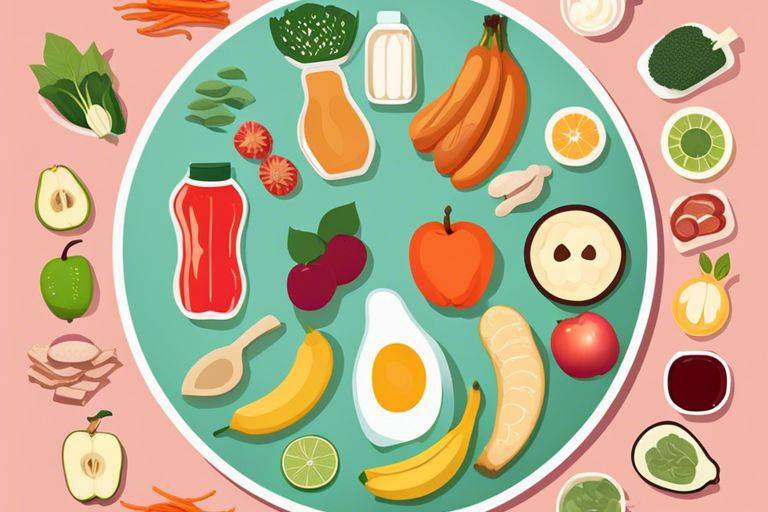
Top 12 Foods for Gut Health
Leafy Greens
After all, you can never go wrong with incorporating more leafy greens into your diet! Greens like spinach, kale, and Swiss chard are packed with fiber, which is necessary for a healthy gut. Not only do they feed the good bacteria in your digestive system, but they also help promote regular bowel movements and reduce inflammation.
Berries
Health is just a handful of berries away! These colorful fruits are rich in antioxidants and polyphenols, which can help reduce gut inflammation and improve digestion. Berries like blueberries, strawberries, and raspberries are also high in fiber, making them a delicious and gut-friendly snack option.
Understanding the benefits of berries can encourage you to incorporate them into your daily diet. By enjoying a mix of fresh or frozen berries, you are not only satisfying your sweet tooth but also nourishing your gut microbiome.
Fatty Fish
For a dose of omega-3 fatty acids, look no further than fatty fish like salmon, mackerel, and sardines. These fish are not only a great source of healthy fats but also contain anti-inflammatory properties that can benefit your gut health. Regularly including fatty fish in your meals can help support a balanced gut microbiome and reduce gut-related inflammation.
To boost your gut health, aim to include fatty fish in your diet at least twice a week. Whether grilled, baked, or pan-seared, these fish options can add a delicious and nutritious element to your meals.
Sweet Potatoes
To get your fix of fiber and nutrients, sweet potatoes are a fantastic choice for your gut health. Packed with vitamins, minerals, and soluble fiber, sweet potatoes can help promote the growth of beneficial bacteria in your gut. This starchy vegetable is also easy to digest, making it a gut-friendly option for those with digestive sensitivities.
For instance, swapping regular potatoes for sweet potatoes in your meals can provide a nutritional boost for your gut. Whether roasted, mashed, or baked, incorporating sweet potatoes into your diet is a tasty way to support your digestive health.
Bone Broth
The potatoes nutrient-rich bone broth is a powerhouse for gut health! Packed with collagen, amino acids, and minerals, bone broth can help repair the gut lining and support the growth of beneficial bacteria. Including bone broth in your diet can help reduce inflammation in the gut and improve overall digestive function.
Kimchi
Potatoes spicy and tangy Korean staple, kimchi, is a fermented food that can work wonders for your gut health. Made from fermented cabbage, radishes, and seasonings, kimchi is rich in probiotics that promote a healthy gut microbiome. The beneficial bacteria in kimchi can help improve digestion, reduce inflammation, and support your overall gut health.
Kefir
Sweet and tangy kefir is a fermented milk drink that is rich in probiotics, making it a fantastic choice for gut health. The probiotics found in kefir can help restore the balance of good bacteria in your gut, improve digestion, and boost your immune system. Adding kefir to your daily routine can be a delicious way to support your gut health.
Sauerkraut
Foods fermented cabbage dish, sauerkraut, is a probiotic-rich food that can benefit your gut health. This tangy condiment is packed with beneficial bacteria that can help improve digestion, reduce inflammation, and support a healthy gut microbiome. By incorporating sauerkraut into your meals, you can enjoy a flavorful way to promote your digestive wellness.
Olive Oil
To truly heal your gut, incorporating olive oil into your diet is crucial. Not only is it a staple of the Mediterranean diet, but it is also rich in monounsaturated fats, which can help reduce inflammation in the gut and promote a healthy balance of gut bacteria. Additionally, olive oil is a great source of antioxidants, which can protect the gut lining and support overall gut health.
Green Tea
Green tea is a soothing beverage that can help calm inflammation in the gut. The antioxidants in green tea, such as catechins, can help reduce oxidative stress and support a healthy gut microbiome. Drinking a cup of green tea daily can be a gentle way to promote gut healing and overall well-being.
Turmeric
The powerful anti-inflammatory properties of turmeric can be incredibly beneficial for gut health. Curcumin, the active compound in turmeric, can help reduce inflammation in the gut lining and promote the growth of good bacteria. Including turmeric in your cooking or taking a daily turmeric supplement can help support gut healing and improve digestive issues.
To fully experience the benefits of turmeric for your gut, consider creating a turmeric latte or adding turmeric to soups, stews, or smoothies. This bright yellow spice not only adds a pop of color to your dishes but also provides a wealth of gut-healing properties.
Ginger
Ginger is a warming spice that can help soothe digestive issues and promote gut health. It has been used for centuries as a remedy for indigestion, bloating, and nausea. Ginger contains compounds that can help reduce inflammation in the gut and support proper digestion. Adding fresh ginger to your meals or brewing ginger tea can be a simple way to incorporate this healing spice into your diet.
Whether you grate fresh ginger into a stir-fry or sip on ginger tea after a meal, you can experience the soothing effects of this powerful spice on your gut. Ginger is not only delicious but also a time-tested remedy for gastrointestinal distress.
How to Incorporate Gut-Healing Foods into Your Diet
Once again, if you want to improve your gut health, it’s crucial to include 12 Foods to Improve Your Gut Health Overnight into your daily diet. Here are some tips to help you seamlessly integrate these foods into your meals.
Meal Planning Tips
GutHealing Meal planning can make incorporating gut-healing foods easier. Start by including fermented foods like yogurt and kimchi in your breakfast, leafy greens like spinach and kale in your lunch, and fiber-rich foods like whole grains and legumes in your dinner. Don’t forget to drink plenty of water and herbal teas throughout the day to aid digestion. After planning your meals, make a shopping list to ensure you have all the ingredients on hand.
Snack Ideas
MealSnack time is a great opportunity to sneak in some gut-healing foods. Opt for almonds or walnuts for a healthy dose of omega-3 fatty acids or sliced bell peppers with hummus for a crunchy and nutritious snack. To satisfy your sweet cravings, try berries or an apple with almond butter for a delicious and gut-friendly treat.
Cooking Methods
TipsTo ensure you’re getting the most out of your gut-healing foods, pay attention to your cooking methods. Steaming, sautéing, and lightly grilling your vegetables will help preserve their nutrients and make them easier to digest. Avoid deep-frying or overcooking foods, as this can destroy some of the beneficial enzymes and probiotics that support gut health. Incorporating these cooking methods into your routine will help you reap the full benefits of these nourishing foods.
Common Mistakes to Avoid
Processed Foods
Now, with processed foods, the biggest mistake you can make is relying too heavily on them for your daily meals. These foods are often stripped of their natural nutrients and loaded with unhealthy additives that can disrupt your gut health.
Sugar Overload
Foods high in sugar can wreak havoc on your gut flora and lead to inflammation in the digestive tract. When you consume excessive amounts of sugar, it feeds the harmful bacteria in your gut, throwing off the balance of good and bad bacteria.
Plus, be mindful of hidden sugars in processed foods and drinks, as they can add up quickly and contribute to your daily sugar intake.
Lack of Fiber
Foods lacking in fiber can be detrimental to your gut health. Fiber helps regulate digestion and promotes the growth of good bacteria in your gut. Without enough fiber in your diet, you may experience constipation and an imbalance in your gut microbiome.
Understanding the importance of incorporating a variety of high-fiber foods such as fruits, vegetables, whole grains, and legumes can significantly improve your gut health and overall well-being.
Gut Health and Mental Well-being
The Connection Between Gut and Mental Health
Not many people are aware of the profound connection between the gut and mental health. The gut-brain axis is a complex communication network involving the gut microbiome, the central nervous system, and the endocrine system. Research has shown that imbalances in the gut microbiota can lead to conditions like anxiety, depression, and even neurodegenerative diseases.
Reducing Stress through Diet
Through your diet, you can play a significant role in reducing stress and improving your mental well-being. Healthy fats like omega-3 fatty acids found in fish, nuts, and seeds can help reduce inflammation in the body, including the brain. Including fermented foods rich in probiotics, such as yogurt, kefir, and sauerkraut, can also support a healthy gut and positively impact your mood.
Health experts recommend incorporating foods rich in antioxidants like berries, leafy greens, and dark chocolate, which can help combat oxidative stress and protect your brain from damage caused by chronic stress. Additionally, consuming a diet high in fiber from fruits, vegetables, and whole grains can promote a diverse microbiome, supporting mental well-being through the gut-brain axis.
Final Words
Now, armed with the knowledge of these 12 healing foods for your gut, you have the power to make informed choices on what to include in your diet. Be mindful of, a healthy gut is crucial for overall well-being, so make sure to incorporate these gut-friendly foods into your meals. Your body will thank you for it!
FAQ
Q: What are the main benefits of consuming gut-healing foods?
A: Gut-healing foods can help improve digestion, boost immunity, reduce inflammation, and promote overall gut health.
Q: Are there specific foods that can help heal the gut?
A: Yes, there are several foods that are known for their gut-healing properties, such as fermented foods, bone broth, and ginger.
Q: How can fermented foods help heal the gut?
A: Fermented foods are rich in probiotics, which are beneficial bacteria that can help restore the balance of gut flora and improve digestion.
Q: What role does bone broth play in gut health?
A: Bone broth is rich in collagen and amino acids that support gut lining integrity, which can help reduce inflammation and promote healing.
Q: Can ginger help with gut health?
A: Yes, ginger has anti-inflammatory properties and can help soothe the digestive system, making it a great addition to a gut-healing diet.
Q: Which foods should be avoided for gut health?
A: Foods high in sugar, processed foods, and artificial additives can all contribute to poor gut health and should be limited or avoided.
Q: How long does it take to see improvements in gut health from consuming gut-healing foods?
A: The timeline for seeing improvements in gut health can vary from person to person, but many people start to notice positive changes within a few weeks of incorporating gut-healing foods into their diet.
